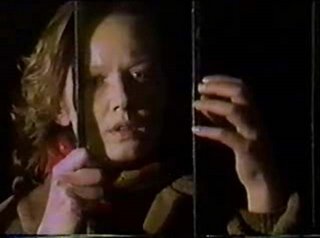Excerpts from Franco Moretti's introduction to Signs Taken for Wonders: Essays in the Sociology of Literary Forms (1983), "The Soul and the Harpy: Reflections on the Aims and Methods of Literary Historiography":
"[H]ow far has empirical research borne out the antithesis between norm and masterpiece on which literary historiography continues to rest? In what sense does Shakespeare 'violate' the conventions of Elizabethan tragedy? Why not say the opposite: that he was the only writer to realize them fully, establishing as it were the 'ideal type' of an entire genre?" (13)
"I can only say that each time I have studied 'low' genres, 'mass literature' (and despite having done it in a way I no longer find satisfactory: looking for their laws of operation in a single work I thought was exemplary--Dracula, The Paul Street Boys, the Sherlock Holmes cycle--and not in a broader and more systematic corpus of 'middle-range' products) I have always ended up finding meanings that were in no sense 'predictable' or 'banal.' Very often, in fact, they were different or even antithetical to what one generally supposes at first sight." (15)
... moving away from Moretti, there is also ...
"At least I’d learned not to be fashionable — that what’s fashionable, or what the smart boys or the establishment approve of, or choose to acknowledge — all that is only one-tenth of what’s going on, it’s only the top one-tenth and it’s likely to be more volatile than all the boring, inarticulate things, where a culture’s real strength is. That’s what A Mirror for England [1970] is about. The unfashionable, solid, petty bourgeois strain in films."
-- Raymond Durgnat, "Culture Always Is a Fog" (conducted in 1977, printed in Rouge in 8).
Over a year ago (!) I wrote a post on 'impersonal genre cinema' that basically wondered about, specifically, action films and the question of generic expressivity--of films (even if they have 'recognizable-within-limits' directors like McTiernan) not being under-the-radar authorial works, but still being expressive in a sense that went above/beyond mere conventionalism. The point beyond that we usually think of genre as a trap, a textbook with rules that only the foolish or the hackish will follow. And maybe this is one of genre's functions. But I'd like to think of film genres as having more ... I hesitate to say positive or uplifting potential, but something more substantial than simply, merely limits. I wonder what good, concrete, but not simply positivistic (data-gathering) work is being done along these lines. For what it's worth, there's a fascinating Moretti piece on cinema available here (as well as for NLR).
Wednesday, August 30, 2006
Monday, August 28, 2006
Godard (one last time, for now)
OK, I think I will put the Godard posts on hiatus; if I return with more of them I won't do it for a 3-4 weeks or so. However, let me end the string with a query: can anyone recommend good sources for discussions of either 'light' (as an aesthetic or philosophical thing) or 'lighting' (in a nuts-and-bolts technical way) in Godard's work? Peripheral stuff--really good discussions of color, for instance--could be helpful too. English is first choice, but with a dictionary and maybe a friend I could hammer out something in a Romance language too. If you can think of something, drop a comment or an email, it'd be very appreciated.
Wednesday, August 23, 2006
Grandeur et décadence, Part II


Don't the above images (part of the same zoom sequence) give the unsettling impression of a video monitor image morphing into an evocation of a Byzantine Virgin icon? The stills above are taken from Grandeur et décadence. I would like to think of Godard walking through a museum, or perhaps sitting by his desk in lamplight with a book of the Old Masters, peering at image after image ("after" in time, "after" in space), realizing or deciding that they were a string of ands to braid with other strings in his own work. Is this zoom presenting us with a quick proposal--that television, in giving us so many images, so much information, and not allowing us to respond to it and communicate with it in its own form, operates like the Church in Medieval Europe? What is important is not whether Godard endorses this comparison or not, but that his film enables it, gets us to question the "omnipresent" or "omnipotent" ("la toute puissance") ...
The Last Movie
I want to think more on The Last Movie will come; I'd like to try to see it in 35mm again (i.e., tomorrow) before it leaves its one-week run at the Anthology Film Archives. But things have been busy, and I have got some actual obligations to see to, so who knows. But let me get some hyperbole and some baldly unsupported assertions out of the way. I struggled, I was perplexed, I ended up very enthusiastic about this film.
Only the first and last reel are really on the level of trippy disjointedness as I had prepared myself for; the middle hour is elliptical, uneven, meandering but relatively straightforward and easy to follow--more or less a "narrative film." But overall, because of the bookends, the film is an autocritical mindfuck, an angry fictive version of a Jean Rouch film, a document-narrative by "us" of some Other's reaction to "us." Film is a sign of reality, an illusion, but for the Peruvians in The Last Movie, the process-of-filming is something very real, it is the act and process of its own creation. The entire narrative isn't about what the Peruvians, or the natives, or the Others would do, or actually do, however--it's really about what "we" do and think (and consequently what we think they do). We have to shoot retakes to make it right, to make our own death (Dennis Hopper's death) more convincing, more degrading, and consequently more the center of attention. We have to be convinced that they won't do it right, that they might kill us in the process. (Meanwhile, around the time Hopper was shooting in Peru, Jorge Sanjinès and the Grupo Ukamau were working with peasants in Bolivia, making real films--films like Yawar Mallku, '69, which I long to see, about an indigenous community that turns the tables on American 'peace' workers who had been sterilizing them ... or El Coraje del Pueblo, '71, which used actual participants in a vicious labor struggle to recreate the film for themselves, for other Bolivian workers & indigenous people.)
The Last Movie is the only film I've seen that makes me think that it well and truly is an 'anti-Western.' (Though: this much-maligned genre that I love so much didn't actually need 'post' or 'neo' updates--it had a strong critical component to it from the classical era onwards.) The Last Movie is quite possibly the only true and intentional avant-garde feature film I've seen from Hollywood. It shatters its own sense of fiction, of narrative illusion, it's just celluloid material projected, and in so doing foregrounds the personal & cultural situations which constitute these fictions. Apocalypse Now? Child's play--everything Coppola tried to do in his film on violence and imperialism and cinema, Hopper has already done--better--by 1971.
Only the first and last reel are really on the level of trippy disjointedness as I had prepared myself for; the middle hour is elliptical, uneven, meandering but relatively straightforward and easy to follow--more or less a "narrative film." But overall, because of the bookends, the film is an autocritical mindfuck, an angry fictive version of a Jean Rouch film, a document-narrative by "us" of some Other's reaction to "us." Film is a sign of reality, an illusion, but for the Peruvians in The Last Movie, the process-of-filming is something very real, it is the act and process of its own creation. The entire narrative isn't about what the Peruvians, or the natives, or the Others would do, or actually do, however--it's really about what "we" do and think (and consequently what we think they do). We have to shoot retakes to make it right, to make our own death (Dennis Hopper's death) more convincing, more degrading, and consequently more the center of attention. We have to be convinced that they won't do it right, that they might kill us in the process. (Meanwhile, around the time Hopper was shooting in Peru, Jorge Sanjinès and the Grupo Ukamau were working with peasants in Bolivia, making real films--films like Yawar Mallku, '69, which I long to see, about an indigenous community that turns the tables on American 'peace' workers who had been sterilizing them ... or El Coraje del Pueblo, '71, which used actual participants in a vicious labor struggle to recreate the film for themselves, for other Bolivian workers & indigenous people.)
The Last Movie is the only film I've seen that makes me think that it well and truly is an 'anti-Western.' (Though: this much-maligned genre that I love so much didn't actually need 'post' or 'neo' updates--it had a strong critical component to it from the classical era onwards.) The Last Movie is quite possibly the only true and intentional avant-garde feature film I've seen from Hollywood. It shatters its own sense of fiction, of narrative illusion, it's just celluloid material projected, and in so doing foregrounds the personal & cultural situations which constitute these fictions. Apocalypse Now? Child's play--everything Coppola tried to do in his film on violence and imperialism and cinema, Hopper has already done--better--by 1971.
Wednesday, August 16, 2006
Godard at School
Thanks to Gabe for alerting me to Serge Daney's "The T(h)errorized (Godardian Pedagogy" (available on Steve Erickson's site, in a translation by Bill Krohn and Charles Cameron Ball, here). It's been ages since I've looked at that piece, probably not since a time that I barely knew any of Godard's '69-'76 work.
For me this is a really telling paragraph:
"For the most radical fringe of filmmakers - those farthest to the left - one thing is certain in 1968: one must learn how to leave the movie theater (to leave behind cinephilia and obscurantism) or at least to attach it to something else. And to learn, you have to go to school. Less to the "school of life" than to the cinema as school. This is how Godard and Gorin transformed the scenographic cube into a classroom, the dialogue of the film into a recitation, the voiceover into a required course, the shooting of the film into a tutorial, the subject of the film into course headings from the University of Vincennes ("revisionism," "ideology") and the filmmaker into a schoolmaster, a drill-master or a monitor. School thus becomes the good place which removes us from cinema and reconciles us with "reality" (a reality to be transformed, naturally.) This is where the films of the Dziga Vertov Group came to us from (and earlier, La Chinoise.) In Tout va bien, Numéro deux and Ici et ailleurs, the family apartment has replaced the movie theater (and television has taken the place of cinema), but the essentials remain: people learning a lesson."
Of course Godard himself soon grew out of the type of cine-school that we associate with his Dziga Vertov years. For viewers & commentators who long for pre-'68, "mildly" politicized Godard, this post-DVG "growth" is seen essentially as a thankful renunciation of that evil-to-end-all-evils, communism, and a pesky corrolary, didacticism--Godard at least realized that was crazy and unsexy, right?, and his work from 1980 onwards has been a bunch of fits and starts that occasionally approach or achieve the Criterion Collection greatness of Le Mépris or Alphaville--back when he was playful and "good" and threatened to alienate those with bad taste (but thank god never challenged those with bad politics).
What makes Godard (particularly the immediate post-DVG Godard, the one of Numéro deux and Ici et ailleurs) so interesting to me is that his didacticism is shared with the viewer--as is his ignorance! This is why he stumbled over "filmer's block," why he had to break down his forms in films that most people don't seem to enjoy (and why film culture has relegated them to secondary status at best). He made brilliant films even then: we just haven't taken the jump with him. I suspect that this property of mutual ignorance-learning is true in a submerged sense for even the pre-'74 Marxist tirades in Pravda, Vent d'est, even Tout va bien and Letter to Jane, etc. ... Godard was trying to toe a hard line in good revolutionary faith, but it took him a few years to realize that he had never really "started over" (the opportunity which Numéro deux presumably afforded him). To start from the bottom up, to realize that the direction of real critical thought and real revolutionary behavior. And I don't mean to use words like "critical" and "revolutionary" as quick and lazy Marxist buzzwords, because I think what characterizes the movement of Godard and his art (and that of his collaborators) at this time is a gradually stronger engagement with ethics--the full realization of the challenge he set forth before to make political films politically. Criticism and revolution of the self, of the social whole and its parts: the final concern is with change for the better rather than change for some revolutionary master. Godard has his heroes & his whipping-boys in the late 1960s, but slowly they dissolved as such.
I would venture that his later incendiary comments, such as his unforgiving criticisms of Steven Spielberg, come from a totally different polemical perspective, one that I think was forged in the 'awakening' and 'rebuilding' of Godard in the 1970s. And to touch on this question of Godard, his distaste for Schindler's List (or Full Metal Jacket?), will require more time, and more thought. But I'd like to do it in the future.
For me this is a really telling paragraph:
"For the most radical fringe of filmmakers - those farthest to the left - one thing is certain in 1968: one must learn how to leave the movie theater (to leave behind cinephilia and obscurantism) or at least to attach it to something else. And to learn, you have to go to school. Less to the "school of life" than to the cinema as school. This is how Godard and Gorin transformed the scenographic cube into a classroom, the dialogue of the film into a recitation, the voiceover into a required course, the shooting of the film into a tutorial, the subject of the film into course headings from the University of Vincennes ("revisionism," "ideology") and the filmmaker into a schoolmaster, a drill-master or a monitor. School thus becomes the good place which removes us from cinema and reconciles us with "reality" (a reality to be transformed, naturally.) This is where the films of the Dziga Vertov Group came to us from (and earlier, La Chinoise.) In Tout va bien, Numéro deux and Ici et ailleurs, the family apartment has replaced the movie theater (and television has taken the place of cinema), but the essentials remain: people learning a lesson."
Of course Godard himself soon grew out of the type of cine-school that we associate with his Dziga Vertov years. For viewers & commentators who long for pre-'68, "mildly" politicized Godard, this post-DVG "growth" is seen essentially as a thankful renunciation of that evil-to-end-all-evils, communism, and a pesky corrolary, didacticism--Godard at least realized that was crazy and unsexy, right?, and his work from 1980 onwards has been a bunch of fits and starts that occasionally approach or achieve the Criterion Collection greatness of Le Mépris or Alphaville--back when he was playful and "good" and threatened to alienate those with bad taste (but thank god never challenged those with bad politics).
What makes Godard (particularly the immediate post-DVG Godard, the one of Numéro deux and Ici et ailleurs) so interesting to me is that his didacticism is shared with the viewer--as is his ignorance! This is why he stumbled over "filmer's block," why he had to break down his forms in films that most people don't seem to enjoy (and why film culture has relegated them to secondary status at best). He made brilliant films even then: we just haven't taken the jump with him. I suspect that this property of mutual ignorance-learning is true in a submerged sense for even the pre-'74 Marxist tirades in Pravda, Vent d'est, even Tout va bien and Letter to Jane, etc. ... Godard was trying to toe a hard line in good revolutionary faith, but it took him a few years to realize that he had never really "started over" (the opportunity which Numéro deux presumably afforded him). To start from the bottom up, to realize that the direction of real critical thought and real revolutionary behavior. And I don't mean to use words like "critical" and "revolutionary" as quick and lazy Marxist buzzwords, because I think what characterizes the movement of Godard and his art (and that of his collaborators) at this time is a gradually stronger engagement with ethics--the full realization of the challenge he set forth before to make political films politically. Criticism and revolution of the self, of the social whole and its parts: the final concern is with change for the better rather than change for some revolutionary master. Godard has his heroes & his whipping-boys in the late 1960s, but slowly they dissolved as such.
I would venture that his later incendiary comments, such as his unforgiving criticisms of Steven Spielberg, come from a totally different polemical perspective, one that I think was forged in the 'awakening' and 'rebuilding' of Godard in the 1970s. And to touch on this question of Godard, his distaste for Schindler's List (or Full Metal Jacket?), will require more time, and more thought. But I'd like to do it in the future.
Tuesday, August 15, 2006
Dutt Drinking
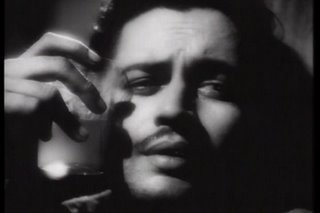
So I've still only seen one Guru Dutt film, actually (Kaagaz Ke Phool), but when I came across this still, I found it captivating. The power and the drama of drink! (This still is from Pyaasa.) The luminescence appears from the bottom of the glass, washing him in light, but it only pushes the shadows to the edges, where they coalesce in dark regions, ready to take over the universe when the glass no longer reflects any light. It's why I--like the sarariman in Oshima's Cruel Story of Youth--drink a lot only when I'm happy, not when I'm depressed ...
And Godard
So one essay I'm reading (by Michael Eng) on Godard states that he's not a dialectician, because he's not interested in synthesis--he is (pace Deleuze) interested in conjunction, 'and ... and ... and ... and.' This much seems true of his mid-'70s work at the very least! Numéro deux and Ici et ailleurs hit home (providing a dizzying challenge) the idea of constant relationships, of the totality of reality really being the conflict of multiple realities ... colliding, washing atop each other, a palimpsest or a streetfight or a chess match or a binary. Godard films Palestinian fighters in 1970, speaking of their own potential deaths in the film in production, Until Victory. They would be killed a few months later. When Godard, with Miéville, went back to take this footage of the unfinished Until Victory, to make what became Ici et ailleurs, Miéville's voice on the soundtrack tells Godard that it was his responsibility to point out that they were speaking of their own deaths. To be a mere observer of history, to take a camera and stick it out there, will not always be sufficient (though sometimes, perhaps, it must be sufficient). Godard and his collaborators were trying to live up to the most difficult challenge of cinema, the challenge of trying to justify the production of their own work (the funding, the act of observation and commentary, the process of transference of images to viewers devoid of the production history that Godard & Co. underwent). A good time, aesthetic greatness--these often act as justifications for films, and maybe in certain times, or (I'd say) to certain extents they are justifications for films being made. (It's only because I loved the cinema so much that I finally realized that life could go on without it, or without fragments of it.) But to relentlessly foreground ethics in the face of this expensive and resource-consuming artform (like architecture)--how frustrating must it be for one's mind and morale!? How do you really justify simply filming people who are willing to die, going to die, for a cause--especially if it might be a just cause? How do you really justify filming people who are apathetic to all this? What kinds of filming, editing, and exhibiting can you be sure will be more productive than putting down the camera, taking up the rifle or initiating the household debate?
Monday, August 14, 2006
Marina Vlady
Sunday, August 13, 2006
Grandeur et décadence (Godard)
I recently watched an MPEG of a telefilm Godard made in 1986 for Série noire: Grandeur et décadence d'un petit commerce de cinéma. It's a revisitation of many of the same themes as in Contempt. Seeing it on my computer screen, muddy and pixelized (and knowing that Contempt has a videophile's dream treatment in its nicely packaged Criterion disc--yet both films are masterpieces, why is only the '63 film so well known!?) was a weird experience.
Tangent: Delerue's score for Contempt is quite possibly my favorite film score ever. I realized this is because it is flowing, beautiful--a cascade of beautiful music. And there it is playing atop beautiful images (nude Bardot; glorious Cinecittà; the cliffs and the sea...), but the work of them in tandem is not to synthesize them into a tidy rapturous experience (a "great story," a "touching ode to movies," a "meditation") but to destroy, to remove us from the narrative flow, the fictive illusion, even the thematic itinerary. It's almost as if it's too much beauty, it's distracting, disorienting, our critical faculties are aroused from this excess and the shrewd disjunction Godard has wrought from it.
At any rate, Grandeur et décadence is a fantastic work, very much "80s Godard" so if you're game for it, please see this film if you can (even if on highly compromised digital forms). The cine-soul survives the medium translation, or in other words, the film's punch lands hard all the same (pixel bits hardly deflect it). Roman Polanski gets enough money for one of the characters ('Jean Almereyda'--Jean-Pierre Mocky) to make ten films. In reality a (non-)filmmaker should ask, too, why Godard gets money to make films ... but he himself, or she herself, doesn't. Godard is that rare cinematic voice constantly asking questions of access, privilege, and funding that still plague the medium of moving images, dividing it amidst the people.
A whiff of textual allusion: Almereyda, meanwhile, plays orpheus to his wife (named Eurydice [Marie Valera])--he wants to move back into the (Underworld of) history. Godard, in a cameo, puts it this way himself: perhaps cinema should be, or is, moving backwards. Eurydice's face may evoke the innocent visage of Dita Parlo (of L'Atalante and Grand Illusion), as characters in the film note ...
Tangent: Delerue's score for Contempt is quite possibly my favorite film score ever. I realized this is because it is flowing, beautiful--a cascade of beautiful music. And there it is playing atop beautiful images (nude Bardot; glorious Cinecittà; the cliffs and the sea...), but the work of them in tandem is not to synthesize them into a tidy rapturous experience (a "great story," a "touching ode to movies," a "meditation") but to destroy, to remove us from the narrative flow, the fictive illusion, even the thematic itinerary. It's almost as if it's too much beauty, it's distracting, disorienting, our critical faculties are aroused from this excess and the shrewd disjunction Godard has wrought from it.
At any rate, Grandeur et décadence is a fantastic work, very much "80s Godard" so if you're game for it, please see this film if you can (even if on highly compromised digital forms). The cine-soul survives the medium translation, or in other words, the film's punch lands hard all the same (pixel bits hardly deflect it). Roman Polanski gets enough money for one of the characters ('Jean Almereyda'--Jean-Pierre Mocky) to make ten films. In reality a (non-)filmmaker should ask, too, why Godard gets money to make films ... but he himself, or she herself, doesn't. Godard is that rare cinematic voice constantly asking questions of access, privilege, and funding that still plague the medium of moving images, dividing it amidst the people.
A whiff of textual allusion: Almereyda, meanwhile, plays orpheus to his wife (named Eurydice [Marie Valera])--he wants to move back into the (Underworld of) history. Godard, in a cameo, puts it this way himself: perhaps cinema should be, or is, moving backwards. Eurydice's face may evoke the innocent visage of Dita Parlo (of L'Atalante and Grand Illusion), as characters in the film note ...
Thursday, August 10, 2006
Worthy Subjects for Further Research


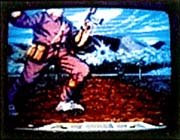
Jayce Salloum (more on him later; for the moment, check out this), with stills from two of his videos, Up to the South (1993, with Walid Ra'ad) and This Is Not Beirut (1994).
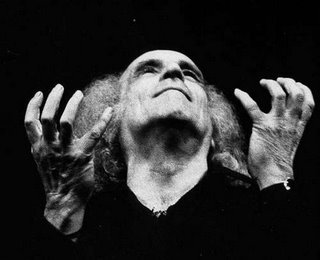
Léo Ferré: which reminds me that I still have yet to see Numéro deux (Godard, '75), for which M. Ferré provides the music.
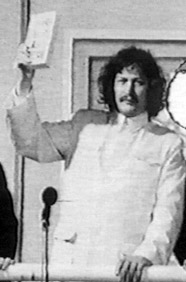
Situationist International #1: René Viénet. Today I picked up a copy of his Enragés and Situationists in the Occupation Movement ("his" book?--a commenter on Amazon wrote that he didn't actually write it himself, its authorship ascribed to him), and it's about time I finally sat down and looked at the file I downloaded of The Girls of Kamare ...

Situationist International #2: Raoul Vaneigem--today I also picked up Vaneigem's great-looking A Cavalier History of Surrealism.
All of these will be subjects for further research on my part. Any or all of these subjects may well re-appear on this blog or in some other writing I do ...
Jammin' the Blues
Back from a long weekend vacation! I'll try for actual content later this weekend, for now I might just put up a couple of YouTube video finds & some web images.
A transfer of Gjon Mili's great 1944 film Jammin' the Blues. It's like The Night of the Hunter but less famous--i.e., just about everyone who knows it seems to love it. Lester Young, et al. If you haven't seen it before you are in for a treat. Enjoy.
A transfer of Gjon Mili's great 1944 film Jammin' the Blues. It's like The Night of the Hunter but less famous--i.e., just about everyone who knows it seems to love it. Lester Young, et al. If you haven't seen it before you are in for a treat. Enjoy.
Wednesday, August 02, 2006
Avant-Garde Blog-a-Thon: Christopher Maclaine

JUST ANOTHER DIAMOND DAY (THE MATERIALS BEFORE US)
Christopher Maclaine is, along with Jean Vigo and Charles Laughton, possibly the greatest filmmaker whose entire directorial oeuvre can be counted on one hand. He made only four films: The End (1952), The Man Who Invented Gold (1957), Beat (1958), and Scotch Hop (1959), each of which is shorter in length than the one before it, the total running time of all of them adding up to little more than an hour. The End may well be Maclaine's masterpiece, but having seen these 16mm treasures twice now, I have to say that his swan song is the one closest to my heart. Maclaine went to a Scottish heritage festival outside of San Francisco and films pipers, dancers, log-throwers, and the like--all kilted and tartan-ed up, argyle socks pulled high and proud. On a certain level my attraction to Scotch Hop is pre-artistic, irrational, resolutely personal. I can't easily resist the totemic pleasures of Celtic, especially Scottish, signs and allusions; my last name is Scottish, and though my heritage is probably no more Scottish than it is any number of Northern European nationalities (Irish, Norwegian, French, etc.) I "feel it." Or at least I think I do. The Powell-Pressburger masterpiece I Know Where I'm Going! is for me essentially a dramatic articulation of my 'more civilized' ancestors or cousins drawing close to the mythic primordial north, with its (and "my") inhabitants, that much closer to Ultima Thula (of course there's another Powell project: The Edge of the World, '37) and the sunless winters. The union of civilization and its wilder verso (though not its opposite), the dialogue brought to a conclusion through action, an event, a meeting.
But "totemic pleasures" are simply the tip of the iceberg for Scotch Hop, and the reason why is the union of "civilization" (or control) and "pre"- or "sub"-civilization (or carnival). Maclaine expresses this union through disjunction--here is a great cine-poet of mismatched cuts, "messy" editing, "pointless" camera angles who ultimately proves through these his deftness with the medium. The bagpipes (white sun highlights on black pipes: a beautiful saturated non-color expression amidst the reds and greens and yellows) provide a music that drapes the entire film, and provides it with an aural skeleton. Dancers move in time to the music, but Maclaine has sped up or slowed down the film just so, so that they only appear to be moving in time to the pipes. A lie before our very eyes, but true, because Maclaine as well as any other cineaste I know has arrived at that fundamental truth of the film-image: the expression of its materiality, the full admittance of its illusory potential and properties, and the exercise of the medium's powers in total comfort with this "confession." Meaning: there are all sorts of tricks and devices and techniques that Maclaine uses in this film, in all his films, but they have moved beyond being tricks or anything else, except their own pure expression. Slow motion or fast motion, the function is above all to operate openly as itself, in time to music. No longer tricks, because they don't have to be disguised as anything, justified as anything, other than themselves. Maclaine is true to his materials and his tools, and in this truth to the celluloid and emulsion, light and shadow and color amidst the trace of five dozen cuts (or whatever), projects outward, revels, in a way that conventional filmmaking standards tend to shore up, suture, and direct our gaze away from.
THE QUESTION OF THE AVANT-GARDE
What is this phrase, 'avant-garde'? What is it about French words that they turn so amorphously monstrous for English-speaking art lovers or cinephiles: 'auteur,' 'cineaste,' 'mise-en-scène,' all word-concepts that have come to mean things in our language vastly different, even crazily separate from, their original and sometimes maybe simpler French definitions. In one sense I do not believe in an avant-garde, or the avant-garde: the cultural struggle on all its fronts and forms has no easy hierarchy. ('Thou shalt not make representational films,' 'Thou shalt not depict Woman,' 'Thou shalt reintroduce the 'flicker' into thine films,' 'Do this in memory of Me [or in anticipation of Me] and all shall be well with the world.') Then again I find myself drawn also to films which do things counter to convention, to standards whether industrial (films to be seen in theaters for $7-10 which generally run 90-180 and tell a story with actors...) or formal-stylistic (conventional films can easily incorporate "experimental" or "out there" aesthetic elements, even richly--but they cannot foreground or serve them, lest they be harshly punished by the marketplace and the rigged court of "public opinion").
One thing that unites this idea of 'the avant-garde' is how hostile people can be to its very existence regardless of its vagueness. So many people see 'the cinema' as a form of moving-photographic storytelling in some sense or another. They push this essence of cinema as though it were true, when it fact it's not at all true, not nearly so comforting and easy. Cinema is not about essences but about powers, and these powers manifest themselves partly in possibility. Cinema can be made without cameras, without photography, without set durations, without actors, without crews, without titles, without images, without sounds, without purpose (just footage), without aspirations to posterity or longevity, without money, certainly without what Noel Burch has termed the 'Institutional Mode of Representation.' They can be made with paints, with scratched or degraded or otherwise manipulated emulsions, with multiple reels projecting on the same space (or multiple spaces), with more than one way to view them, with two or more actors playing the same 'character' (Maclaine did it, Buñuel did it...), with the borrowed charm of children, with an entire community, or with nobody, with running times far too long or too short to book a United Artists theater screen, and with abandon. The only essential properties of the cinema seem to be 'time' and 'space,' and by essential I don't mean to say that these properties must necessarily ever be fixed. Indeed, the more closely we look, the more we see the lines between our arts and our disciplines, which language inscribes, are seams easily broken--already broken. The only thing we need concern ourselves with, at the outset, is to guard against a tendency to totalize and categorize and fashion crutches out of labels or rules. 'The avant-garde will save us' or 'the avant-garde is pure' are expressions fully as weak as 'we shall accept the boundaries of convention with no questions.' This thing 'avant-garde probably doesn't really exist, and it certainly doesn't exist on just one or a few fronts, in just one or a few ways. When it comes down to it, when we examine the words we use, I am not for the avant-garde, but I would like to think I am all for possibility.
A BRAND NEW DAY (A FRONTIER OF EFFECTS)
Christopher Maclaine, speed freak, destructive, true tortured poet--a Beat Baudelaire on benzedrine for the 1950s-60s (re)emergence of the American avant-garde (the birth of the so-called "New American Cinema"). In his book Film at Wit's End (the Maclaine chapter which constitutes a large chunk of the scarce available material on this filmmaker), Stan Brakhage writes of Maclaine's destructive behavior, his addictions and his wretchedness--but also his passion, his fleeting moments of happiness, the fleeting moments in which he'd inspire happiness in others. About Scotch Hop he praises the rhythmic properties of the film, as a "pure masterpiece":
Maclaine did not accomplish the exquisite rhythmic sense of Scotch Hop by sitting down and figuring dry tables of numbers and rhythms or studying the formalities of composition and rhythm. Others may talk of the technical details of rhythm--the methods to attain it, its analysis and explanations--but they would not be able to make such a masterpiece as Scotch Hop. Chris Maclaine was able to accomplish what he did with this film because he loved what he was filming. He had his day--perhaps only one such day in his whole miserable life. He had a camera with him and he had worked with it for years, and he knew how to operate it so that it did not interfere with him. He danced with it.
--p. 125-126, Film at Wit's End.
Seeing Scotch Hop most recently, I was reduced to tears within moments (the film is only a few minutes long) and I was overwhelmed by this expression of affection and openness by a filmmaker, a person, eventually torn apart by his enthusiasms, his manic fears and passions. He was never to make another film again, never to turn his camera on another subject, never to edit strips of film into another expression of his profoundly consumptive love. No more moments where filmic "truth and lie" fall into synthetic embrace. With Maclaine, as with so much (all?) great artistic activity, we are sooner or later, at one time or another, humbled and strengthened simultaneously, unable to pull apart the articulation from the matter being articulated, wherein the film is a performative utterance which constantly projects into time, space, and mind the indestructible first-last moments of its utterance ... where filming & screening are really one and the same, parts of the same activity, whose deepest individualisms will still be ultimately, ideally, bridges within social reality, among all people. If this expression, 'avant-garde,' means anything truly useful, it is as a stamp, an intention, hopefully a guarantee that cinema, that art, will never ever run out of new ways of doing this.
_____
Here are links to other participants in the A-G Blog-a-Thon (let me know if I'm missing any so I can update): Acquarello at Strictly Film School, Brendon Bouzard at My Five Year Plan, Jim Flannery at A Placid Island of Ignorance, Flickhead, Richard Gibson. Ed Gonzalez at Slant, Michael Guillen at the Evening Class, Tom Hall at The Back Row Manifesto, Andy Horbal at No More Marriages!, David Hudson at Greencine Daily, Darren Hughes at Long Pauses, Jennifer Macmillan at Invisible Cinema, Peter Nellhaus at Coffee Coffee and More Coffee, David Pratt-Robson at Videoarcadia, Girish Shambu, Michael S. Smith at Culturespace, Tom Sutpen at If Charlie Parker Was a Gunslinger, That Little Round-Headed Boy, Thom at Film Of The Year, Chuck Tryon at The Chutry Experiment.
Subscribe to:
Comments (Atom)




